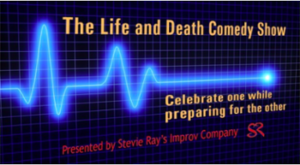
Credit: Rochestercivictheatre.org
“We’re not going to make fun of death, we’re just going to make fun of how silly it is that nobody in America talks about the only inevitable thing out there, besides taxes,” Stevie Ray, a comedian based in the Twin Cities, said of his show, “The Life and Death Comedy Show.” He’s right: American’s don’t talk about it enough, and that results in neglecting to plan for it. A study published in the July, 2017 issue of Health Affairs found that only 36.7 percent of 795,909 people polled had completed advance directives.
A few years ago, Stevie Ray was approached by health care organizations in the Twin Cities that were running into roadblocks getting people to consider end-of-life issues and fill out end-of-life directives. He jumped at the opportunity to tackle the topic with humor. Ray worked with advanced care directors and health care professionals from major health care institutions in Minnesota to create a show that is informed and informative, as well as funny.

Credit: Irac4calendar.org
The show approaches subjects like Advance Care Plans, DNR/DNI’s, funerals and family members’ final wishes with a light touch, aiming to elevate the importance of end-of-life planning with a spoonful of sugar. One of the bits from the show consists of a lineup of people giving examples of some the worst things that can happen if you haven’t completed advance directives. One actor, feigning lying in a hospital bed yells: “It’s not DNR, it’s DO resuscitate!” Another actor says, “I’m pretty sure dad would have wanted to be buried in his Zubaz.”
Another bit in the show is “The Health Care Agent Dating Game.” The eligible single lady interviewing the bachelors asks, for her first question, “I want to be kept pain free in my final days. How would you keep me pain free?” Aside from the scripted bits, the rest of the show is all improvisational, taking suggestions from the audience to craft comedic scenes about death and dying.
By poking fun of how hard it is to talk about death, Stevie Ray and his troupe break the ice for the audience, who will hopefully continue having these difficult conversations after they leave the show. As Ray says, “Sometimes just attending the show is enough to have the walls come down.”

 Stevie Ray’s “The Life And Death Comedy Show” Gets People Talking
Stevie Ray’s “The Life And Death Comedy Show” Gets People Talking


 “As Tears Go By” by Marianne Faithfull
“As Tears Go By” by Marianne Faithfull

 Funeral Favors Offer Visitors a Tangible Memento
Funeral Favors Offer Visitors a Tangible Memento















